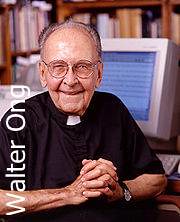Duluth, Minnesota (OpEdNews) October 31, 2021: I recently discussed the American psychiatrist Albert Rothenberg's 1988 book The Creative Process of Psychotherapy (New York: W. W. Norton) in my OEN article "Dr. Albert Rothenberg on Creativity" (dated October 19, 2021):
In it, among other things, I pointed out that Dr. Rothenberg stresses the key role that articulation plays in psychotherapy, on the one hand, and, on the other, I noted that the American Jesuit Renaissance specialist and cultural historian Walter J. Ong's discussion of the key role that rhetoric plays in his 1971 essay "Rhetoric and the Origins of Consciousness" in his 1971 essay collection Rhetoric, Romance, and Technology: Studies in the Interaction of Expression and Culture (Cornell University Press, pages 1-22).
Incidentally, Ong further elaborates his point about articulation in his 1971 essay in his 1982 essay "The Agonistic Base of Scientifically Abstract Thought: Issues in [Ong's 1981 Book] Fighting for Life: Contest, Sexuality, and Consciousness," which is reprinted in An Ong Reader: Challenges for Further Inquiry, edited by Thomas J. Farrell and Paul A. Soukup (Cresskill, NJ: Hampton Press, 2002, pages 479-495).
Now, in my book Walter Ong's Contributions to Cultural Studies: The Phenomenology of the Word and I-Thou Communication, second revised edition (New York: Hampton Press, 2015; first edition, 2000), I discuss the American psychiatrists Thomas Patrick Malone and Patrick Thomas Malone's 1987 book The Art of Intimacy (New York: Prentice Hall) in connection with Ong's celebration of I-thou communication (for specific page references in my book to the Malones, see the "Index" [page 313]).
But the Malones' 1987 book The Art of Intimacy also involves a theory of psychotherapy, just as Dr. Rothenberg's 1988 book The Creative Process in Psychotherapy does.
In any event, Dr. Rothenberg's extended discussion of the key role that articulation plays in psychotherapy prompted me to remember the memorable experience I myself had had in the context of psychotherapy with a bold new (to me) psychotherapist. I was consulting him because I was concerned about the complicated grief that I had been experiencing after the death of my former teacher and mentor Walter J. Ong (1912-2003). I had previously consulted other psychotherapists about my concern.
In preparation for my intensive consultation with the new psychotherapist in July 2006, I compiled in June 2006 a list of about a dozen memories from my childhood (roughly, under the age of ten, the earlier the better). But I had not attempted to compile a complete or exhaustive list of my early memories - just about a dozen striking examples.
Now, for my present purposes, I prefer not to list here the details of my memories that I listed, because I want to stress here the articulation involved in the fourfold exercises that the psychotherapist had me undertake with them.
When I met with the new psychotherapist in July, he eventually asked me to complete an exercise for each memory. He did not claim that he himself was the originator of this fourfold exercise, which I will style here as a heuristic exercise designed to advance my own personal articulation (in Dr. Rothenberg's terminology) - but perhaps with occasional assists to my own articulation from the psychotherapist himself, based on his knowledge of and empathy for me.
For each of my memories, I was supposed to complete the following statements, one by one:
(A) I am . . .
(B) Other people are . . .
Next Page 1 | 2 | 3 | 4 | 5 | 6
(Note: You can view every article as one long page if you sign up as an Advocate Member, or higher).





